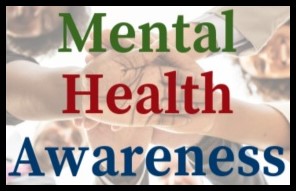 In this segment of our Mental Health Awareness series, we'll take a look at Obsessive Compulsive Disorder, opens a new window, or OCD.
In this segment of our Mental Health Awareness series, we'll take a look at Obsessive Compulsive Disorder, opens a new window, or OCD.
People tend to have misconceptions, opens a new window about Obsessive Compulsive Disorder. Sometimes people jokingly say "She's so OCD!" about someone who is very organized. OCD is often unrelated to a desire for tidiness and it isn't a joke, opens a new window. OCD is a complex and serious anxiety disorder.
One experience that many people with Obsessive Compulsive Disorder have is recurring intrusive thoughts, opens a new window. An intrusive thought is an unwelcome and upsetting mental image - a bad thing that might happen. One example of an intrusive thought is the idea that a loved one will die, but whatever the bad thing is can vary. Experiencing intrusive thoughts can make you feel awful. You try to not think about it, but you think about it anyway, and then you feel terrible. Everyone experiences intrusive thoughts, opens a new window at some point. But when it becomes impossible to dismiss or ignore your intrusive thoughts and you find daily life unmanageable, those thoughts are "obsessive."
To decrease terrible feelings caused by intrusive thoughts, some people with Obsessive Compulsive Disorder develop a series of movements (and sometimes sounds or words), to prevent the bad thing from happening. These movements are generally called "rituals, opens a new window." A simple example of a ritual is tapping something with your hand, but rituals vary. We generally know that our behavior isn't logical when we do these rituals. We know on some level that the ritual will not prevent the bad thing from happening, but if something prevents us from performing our rituals, we tend to become extremely anxious and upset. For us, the bad thing will happen if we don't complete our ritual. At this point, performing the ritual has become "compulsive."
Unfortunately, even though you do your ritual perfectly, your intrusive thoughts and terrible feelings don't go away forever. In fact, working through a ritual tends to reinforce an intrusive thought.
Not all people with OCD experience the same cycle of obsessions and compulsions.
Although there is no known cure at this time, there is help for those of us with Obsessive Compulsive Disorder.
If you or someone you know is experiencing symptoms of OCD, opens a new window, the following organizations offer varying levels of help:
- NAMI St. Tammany, opens a new window offers many resources and programs here on the Northshore.
- Louisiana 2-1-1, opens a new window, also known as Vialink, opens a new window, is available 24/7. Dial 211 on your phone, and speak to a specialist who will offer crisis intervention, information, and referral.
- The National Suicide Prevention Lifeline, 1-800-273-8255, en español 1-888-628-9454, is available 24/7. National Suicide Prevention's TTY number is 1-800-799-4889. They also have an online chat service.
- For the Crisis Text Line, text TALK to 741741. After sending this text message, you will receive an automated text asking about your crisis. Your response helps the Crisis Text Line team pair you with a counselor, and they connect you with that counselor.
- The NAMI HelpLine, opens a new window, 1-800-950-6264, is available Monday - Friday, 9 AM - 5 PM CST. You can also email info@nami.org, opens a new window.
- IMAlive uses a chat service to respond to people in crisis. Click the "Chat Now" button to begin speaking with a trained volunteer.
If you or someone you know needs immediate or emergency help, please call 911.
Please note: This discussion of OCD is informational and is not a replacement for consultation with a physician or therapist.
We have compiled a list of St. Tammany Parish Library resources and external websites that have more information about OCD. Please contact your nearest St. Tammany Parish Library reference librarian, opens a new window if you need help getting any of the items on this list:



Add a comment to: Mental Health Awareness: Obsessive Compulsive Disorder (OCD)